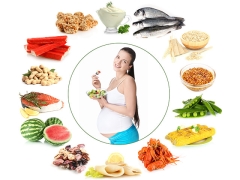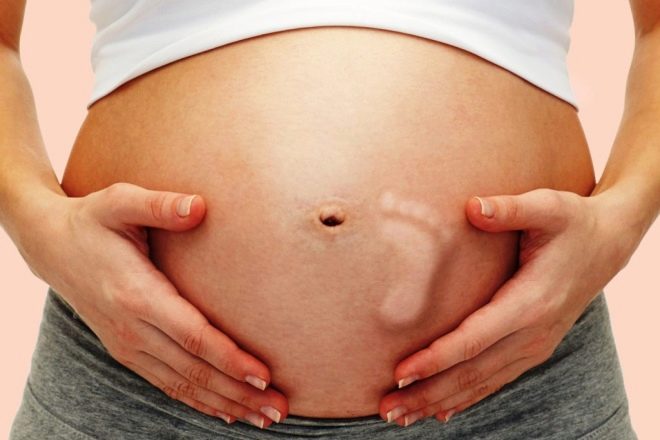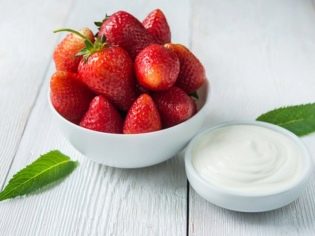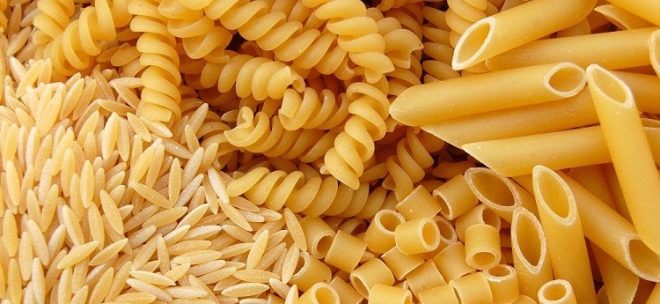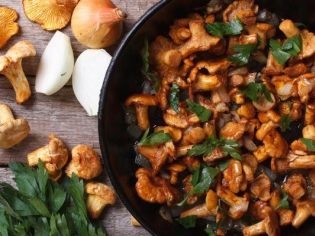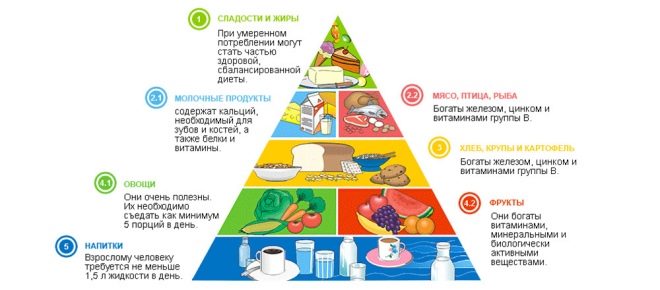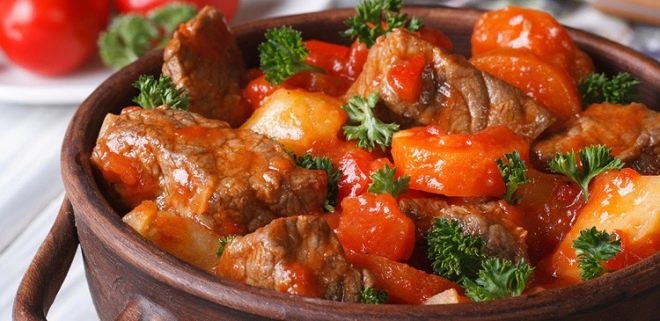Proper nutrition during pregnancy
Everyone knows how important nutrition for the future mother and her baby. However, not everyone understands how to properly organize the nutrition of a pregnant woman, so that everything that was on her table would only benefit.
In this article we will explain how to do this, as well as give an exemplary menu for the future mother.
Principles of nutrition during pregnancy
For some reason, it is considered among the people that a woman in an “interesting position” should eat for two. In practice, this approach usually ends badly - a woman is gaining overweight, pregnancy is complicated, labor is harderand after them it is very difficult for a woman to get rid of what was deposited on the hips and abdomen, while she ate for two.
There are several basic principles of nutrition for pregnant women, following which you can keep a slim figure and provide the baby with everything necessary for his growth and development. Here they are.
Naturalness
All food should be as natural as possible. Today, of course, it is quite difficult to find in stores natural products made without food preservatives, additives, flavors and emulsifiers. But you need to strive for this.
You may have to look for shops in the city, where natural products from farmstead farmsteads are presented, to go to the markets, to study the assortment of grandmothers-dachnits who sell what they themselves grew on the site.
Diet and snacks
Do not allow overeating and fasting periods. If, even before pregnancy, a woman allowed herself to eat “at random”, fast during the day, and eat well after work or school, then everything should change with the onset of pregnancy.
You can not starve or gorge on the dump. If you can not eat normally during the day, be sure to eat - apple, yogurt, cottage cheese.
Benefit
All food should be considered in terms of benefits, not taste. Even if you want to eat only cakes and nothing else, withIt will be necessary to think about how much carbohydrates from the mother’s bloodstream the crumb will get in her womb, and also about how difficult it will be for him to grow., if there is an excess of carbohydrates, but there is a catastrophic lack of calcium, proteins, healthy fats and vitamins.
What a tasty mom is not always useful for a child. The maximum task is to find a balance in which both the mother will be fine and the baby will benefit.
Drinking mode
There should be enough water in the diet. Drinking regimen is extremely important for the kidneys and liver of a pregnant woman to work properly.so that metabolic processes go faster.
Both the woman and her baby, which she wears under her heart, need water at the cellular level.
The daily need of a pregnant woman is about 1.5-2 liters of clean drinking water. In order to prevent edema, it is important that the amount of fluid is not excessive.
Balance
Meals should be balanced. The concept of "balanced diet" includes an understanding of the rules of combination products. In order not to starve yourself and not starve the child, and also not to overeat and overfeed the baby, you need to remember that every day a woman in the "position" needs to receive:
- at least 150 grams of protein per day;
- about 100 grams of fat (of which only 5–8 grams of oil, the rest in complex products);
- 400 grams of carbohydrates;
- all the necessary vitamins and minerals.
This does not mean that 400 grams of carbohydrates can be consumed at one meal, and the next one can be put on proteins and fats.
All of these essential ingredients should be distributed evenly between all meals.. In each of them must be represented and proteins, and fats, and carbohydrates.
Control over calories
Do not think that a woman will spend all nine months with a calculator in her hands, counting how many calories she has consumed and how much she has spent. If there are no problems with weight gain, if the doctor does not recommend a special diet, It will be quite enough to combine proper nutrition according to the above principles with a light physical exertion.
Many pregnant women mistakenly believe that exercise is contraindicated because they are expecting a baby. In fact, there are not so many contraindications - cervical insufficiency, the threat of miscarriage, the threat of premature birth, lack of water, symphysitis in the third trimester.
If there are no such complications, and the gynecologist did not warn about the need for complete rest and bed rest, then the woman, up to the birth, can take walks in the fresh air, do swimming and aqua aerobics, yoga, do gymnastics. All this will ensure the correct consumption of calories received.
Consequences of violating the principles
Ignoring the requirements of proper nutrition during pregnancy can lead to a wide variety of disturbances in the mother's body and complications of the pregnancy itself. Here are just some of the negative effects.
Overweight, pathological gain
Depending on the duration of pregnancy, a woman should gain in weight about 200-400 grams per week. And, the greater the initial weight of a woman before pregnancy, the less should be an increase in body weight while carrying a child.
If kilograms arrive promptly, there is a threat to the life of the baby and its development, the likelihood of miscarriage, premature birth, and the birth of a large fetus increases. Have women with high weight gain often have problems in the process of giving birth. They are manifested in the weakness of the tribal forces.
Overeating significantly complicates the condition of the pregnant woman in the third trimester, when the load on the legs, pelvic bones, lower veins increases. Excess weight increases pressure, which leads to the development of unpleasant pathologies - hemorrhoids, varicose veins in the legs, symphysitis, etc.
Gestosis
This is a serious condition that threatens the life of the baby and the mother, because at any time it can lead to premature birth, to the discharge of water, to the intrauterine death of the child, the occurrence of bleeding.
Gestosis and extra pounds are interrelated. With excessive pathological weight gain, a woman may begin problems with blood pressure, it will begin to rise.
The fluid, which, when gestosis is delayed in the tissues, creates swelling. Excessive amounts of sugar and carbohydrates can trigger diabetes mellitus, even if the woman had not had it before. Against the background of such gestational diabetes increases the likelihood of malformations in the baby, difficult birth of a woman.
Large or hypotrophic fetus
The probability of development of a large fetus usually becomes known in the second trimester, when the children begin to grow in different ways. The dimensions of the baby are not always associated with the mother's diet, since there is a considerable proportion of genetic predisposition in height and weight. However, women with large weight gain are more likely to give birth to large and even giant babies.
Major in obstetrics is a child whose weight at the time of birth exceeds 4 kilograms, and the giant is called the baby, whose weight at birth is more than 5 kilograms.
It is very difficult to give birth to such children independently, naturally, the risk of birth trauma and disability of the child increases. therefore Often such pregnancies end up with a caesarean section that is logical in this situation.
If a woman is undernourished, caring for the preservation of the figure, she may have another extreme - a low-weight hypotrophied fetus, which was deficient in nutrients. These children have significantly lower immune defenses, often there are abnormalities of internal organs., babies born with a weight of less than 2500 kilograms, worse adapt, more often get sick.
Nature protects the baby from such mothers as soon as he is conceived. Under the action of the hormone progesterone, in the first weeks of pregnancy, the appetite increases and remains so almost until birth. The exceptions are cases of toxemia, when a woman would be happy to eat, but can not. In this case, she often needs medical help to prevent fetal malnutrition.
Metabolic disorders
Eating disorders can lead to violations of the water-salt balance, mineral metabolism and the body's supply of vitamins. At the same time, various metabolic disorders develop in both the mother and the fetus.
Mom can hair fall out, to break her nails, her teeth only because her baby will by all means look for the calcium he needs for bone growth, if he is pathologically short. If a woman eats few foods with iron content, she can develop anemia, which also affects the condition and well-being of a growing baby.
Excessive concentrations of calcium, magnesium, and iron are also dangerous. Thus, hypercalcemia leads to damage to the kidneys and urinary system, and an excess of iodine can cause problems with the thyroid gland and hormonal background.
Constipation, hemorrhoids
Even quite normal in quantity, but an unbalanced diet can lead to constipation. This is an unpleasant consequence of eating large amounts of solid foods, carbohydrates, and a small amount of fiber.
Constipation can cause a lot of trouble while carrying a child they increase intoxication, worsen digestion, general well-being. In addition, the probability of hemorrhoids increases tenfold. - a state of painful and painful, which is quite difficult to cure during pregnancy.
Catering
Even if, before the onset of pregnancy, the woman tried to eat properly, followed the three meals a day, after the test showed two treasured stripes, everything would have to be reconsidered in her diet.
Start with the number of meals. During pregnancy, food should be fractional. 5-6 meals a day.
If the number of meals increases, the portions, respectively, should decrease. The total amount of food per day may remain the same, because the size of the stomach during pregnancy does not change in any way.
We'll have to think about the quality, energy value and beneficial properties of products that will be included in the six-fold diet of the pregnant.
According to the new rules a woman will have to eat every 3-4 hours, even if the feeling of hunger does not appear. In the morning, after waking up, you always need to “start” digestion, taking a glass of water at room temperature on an empty stomach half an hour before breakfast. After that, you can do personal hygiene and morning toilet, and only then go to breakfast.
If a woman wakes up at 7 am, then:
- she will have breakfast at about 7.30;
- the second breakfast is at 10.30;
- lunch at 13.00;
- afternoon tea - at 16.00-16.30;
- dinner at 19.00;
- light snack before bedtime - at 21.30.
The last dense meal should be no later than 2.5-3 hours before bedtime, otherwise all the fats and carbohydrates obtained from dinner will be digested in a dream and will not be delayed where they are needed.
In between meals, you should drink clean water, weak green tea, homemade fruit drinks from fresh berries. Freshly squeezed fruit juices are not counted in the amount of liquid, as they fall into the food category.
At first, it may seem rather difficult for a woman to comply with such a regime, because she does not always have the opportunity to fully eat, especially in the early stages, when there is quite a lot of time left before going on maternity leave. In this case It is worth stocking up several food containers in which the expectant mother will take the necessary food with her to work or to the clinic..
The correct eating habits will gradually be formed, which the woman will be able to keep even after giving birth, because she is to be responsible for breastfeeding.
Often, pregnant women complain that they cannot cope with a harmful product or cannot get rid of the habit of eating in the middle of the night, because “I really want it”. Psychologists recommend not to force yourself and give yourself the opportunity to eat if you really want, exactly what the soul is asking for. However, you should limit yourself if the product is included in the list of non-recommended during pregnancy: its quantity should be small.
Nightly snacks, according to nutritionists, are a sign of unbalanced daily meals. Normally, the body should rest at night, and not digest food, because digestion is a responsible and hard work for it.
If everything is planned correctly, to ensure all day meals, to provide the necessary combination of products, then the desire to eat at night will gradually come to naught. As long as it comes off, you can allow yourself in the middle of the night one apple or one apricot, not more.
Nightly zhor is not a physiological need of the body, but a psychological one. This should not be forgotten.
Permitted Products
A woman who does not have pathologies of the gastrointestinal tract, diabetes mellitus, kidney disease, or abnormal weight gain can eat almost all foods that have been in the diet before. We will tell about restrictions below.
Proper nutrition in the period of carrying a child does not imply the introduction into the diet of new products that are not typical of the geographical area in which the expectant mother lives. For example, a resident of Yakutia should not lean on pineapples, because you can get vitamin C in the right amount from cranberries.
To plan your menu for the day, week, or even a month, it is important to know exactly what foods are not prohibited. It is understood that permitted foods should be mandatory and included in the daily diet.
Bread and pastry
You can eat baked goods until 150 grams per day, while giving preference to rye, dietary salt-free bread, bread from wholemeal flour, with bran, seeds.
Bread should not be eaten fresh and soft, it is best for pregnant women to eat yesterday’s or the day before yesterday’s bread. You can sometimes treat yourself to whole grain breads, as well as bread crumbs and lean pastries.
Meat and poultry
Women in an "interesting position" recommended low-fat varieties - such as rabbit, beef, veal, chicken and turkey. All meat should be steamed, baked in the oven, boiled, stew.
It is undesirable to consume meat products and poultry during pregnancy. Daily allowance of meat products - 150 grams per day.
A fish
Like meat, fish is a rich source of protein. You can eat it around 100-150 grams per day. When choosing a fish, low-fat varieties should be preferred. - pollack, haddock, pink salmon, trout.
Oily fish such as mackerel and herring can cause an oversupply in fat, and the balance will be disturbed.Fish also cook in a double boiler, stew, bake. In its fried and smoked form, it will not bring great benefit to the expectant mother and child.
Milk products
As a source of proteins and fats, milk is an indispensable product during pregnancy, rich in calcium and other beneficial substances.
Whole milk to future mother can be consumed about 200 grams per day. It does not make much difference whether she will drink it in an afternoon snack in the amount of a whole glass or divide into two doses, adding to the porridge in the morning and leaving a half-glass for afternoon reception for self-administration.
Cottage cheese in quantity 100-150 grams per day, choose only fresh, low-fat or low fat, without dyes and food additives, without pieces of fruit, since preservatives are most often found in such curd products.
Butter - 20 grams per day, sour cream - 2-3 tablespoons. All dairy products for pregnant women should have a minimum percentage of fat.
Eggs
Be careful with chicken eggs. They belong to the list of permitted products rather conditionally with a large number of reservations. In a week pregnant you can eat no more than 1-2 eggs in boiled form.
Butter
Vegetable oils must be part of the dishes and salads for pregnant women. A day is enough 15 grams of sunflower oil. For olive and other vegetable oils, the “dosage” is the same.
Vegetables
A woman who is expecting a child should eat as much raw vegetables as possible. It is a source of vitamins and fiber, without which normal healthy digestion will not be possible.
Carrots, onions, garlic, fresh greens, fresh cabbage, not subjected to heat treatment, tomatoes, cucumbers, paprika are welcome.
Vegetables that cannot be eaten raw can be boiled or stewed. This applies to beets, zucchini, squash, pumpkin. You should be wary of potatoes: this is a rather insidious vegetable, which can lead to weight gain.
Fruits
Pregnant, overweight, diabetes, a tendency to allergies, you can eat any fruit. If there are some limitations, bananas, grapes, tropical fruits, some citrus fruits should be excluded.
Apples, pears, peaches and apricots, plums are highly recommended to everyone without exception. In winter, when there is no abundance of affordable fruit, you can enrich the diet with dried fruits, prunes and figs.
Groats
It is difficult to imagine a full-fledged diet without so-called long carbohydrates, so a woman should be taken to eat cereals on a daily basis. The most useful - buckwheat, whole oats, corn. Be careful with rice and beans.
Pasta
They are allowed, but in small quantities. Noodles or vermicelli, for example, can be added to the soup.
If a pregnant woman wants pasta or spaghetti for a second, she can afford it, provided that she has no problems with weight and metabolism, but in small quantities and with the full rejection of bread on this day.
Sweets and drinks
Of sweets allowed marshmallow, delight, milk chocolate. All these goodies should be limited and taken on a small piece per day, if there are no contraindications and special orders of the doctor.
The preferred drinks are green tea, unsweetened compotes, made by yourself from fresh fruit or dried fruit, homemade fruit drinks.
Prohibited Products
Women waiting for the birth of the baby, will have to limit themselves in the admission of products that may adversely affect the health of both. During pregnancy it is forbidden to eat a lot of salt, also the amount of salt is limited to 5-7 grams per day. Exceeding this rate may lead to fluid retention in the tissues and the appearance of edema.
The list of banned products is not a guide to action, it is just a warning, a reminder about what food is better to exclude or minimize.
Rational nutrition during pregnancy does not imply the following foods:
- Pork and lamb. Such fatty meats can negatively affect digestion and metabolism.
- Fast food. The products that are used to make burgers and pizza, in most cases do not comply with the principle of natural food, and often have an expired shelf life. In order to "reanimate" them, cooks use chemical compounds and preservatives, as well as flavors, which are harmful and completely unnecessary for the body of a pregnant woman substances. In addition, in fast food is always a lot of fat.
- Carbonated drinks and store juices. They contain too much sugar, from the use of which nutritionists warn future mothers. Carbonated drinks also cause increased gas formation in the intestines, contain dyes and preservatives.
- Confectionery. Buns and cheesecakes, pastries made from yeast, fancy pastries and puff pastry, all biscuits of factory production, as well as fatty cakes, pastries and sweets are banned. Nothing, except for the huge amount of carbohydrates, which are absorbed quickly and require additional insulin from the pancreas, is not in them.
- Dairy products and cheeses. A woman in the "position" should refuse to buy processed cheese, because they contain a large amount of fat. You should also abandon the ready-made curd sweets, curd cheeses, glazed curds, ready-advertised curd and dairy desserts. All dairy products with a high fat content (milk 3.2%, sour cream 20%) should be replaced by less fatty or skimmed.
- Sausages and fish. It is necessary to completely refuse to accept sausages, sausages, smoked meat, salted and smoked fish, fish caviar, factory pate, canned meat and fish. If you really want sausage, you can cook it at home from good beef or rabbit meat - there are plenty of recipes, how to do it.
- Sweets. You should not eat factory-made ice cream, condensed milk, jams and marmalade.
- Roast. All meals that are eaten roasted during pregnancy should be excluded. It is better to choose any other method of cooking - stew, hover, boil, bake in the oven.
- Mushrooms. Mushrooms are very poorly digested by the human body, during pregnancy there are practically no food benefits from them, but the load on the digestive organs increases.
- Potatoes. Despite the fact that in Russia potatoes are considered the second bread, and sometimes even the first, an excess of starch is useless for pregnant women. It is better to minimize the consumption of this vegetable, for example, in addition to the soup, since it is difficult to imagine the first dishes without this ingredient.
- Spice. A woman in the "position" is to abandon the spices in general. Acute, especially with heartburn, only provokes attacks of gastric juice reflux into the esophagus, and spices whet the appetite, and many women and without them it is difficult to cope with their appetite during pregnancy. When constipation spices only increase the symptoms.
- Chips and crackers. For the preparation of such "little things" use a large number of dyes, artificial flavors, preservatives. The use of such products is highly undesirable.
- Strong tea and coffee. Such drinks during pregnancy, despite numerous discussions around this issue, are prohibited. Tea and coffee have a direct effect on blood vessels, heart function, arterial blood pressure. Sometimes weak coffee with milk is recommended for women with hypotension, but such an appointment must be made by the attending physician.
- Alcoholic drinks. This applies to all drinks, without exception, regardless of the naturalness, strength and useful invigorating properties ascribed to them. Pregnancy and alcohol are not compatible in principle.
- Marinated products. Despite the fact that women who are expecting a baby, especially on small periods, want salted cucumbers or lecho, such products are considered prohibited due to an excess of salt, vinegar and spices in them. AT first trimesterwhen gustatory "quirks" are most pronounced under the action of progesterone, small deviations from this requirement are permissible, but if the woman observes the measure. In the third trimester, especially in the last month, marinades are prohibited in any form and quantity, since they contribute to the appearance of puffiness.
- High-sugar fruits and berries. A woman, especially with a tendency to gain weight, needs to choose berries and fruits more carefully. It is better to replace raspberries with cranberries or cherries, and bananas, sweet juicy varieties of pears, peaches and grapes should be limited as much as possible.
- Cereals and legumes. Beans and peas should be taken with caution, as they promote gas formation in the intestine and rapid weight gain. Among the cereals, you should avoid semolina, pearl barley, white steamed rice, chops.
The need for vitamins and microelements in the weeks of fetal development
The baby in the womb for nine months passes through all stages of human development in the course of evolution.
In the early stages, the organs are laid down, then the bones and cartilage tissue begin to grow, then the crumb begins to gain mass, subcutaneous fat. Thus, at different periods of pregnancy, the fetus needs a different ratio of beneficial substances that it receives from the mother's blood through the mother-placenta-fetus system.
Proteins are the main building material for cells, and from them a new organism is formed inside the woman.
Carbohydrates are the "battery", which supplies energy to all processes in the body of mother and her baby, without exception.
Fats also give energy, but, in addition, they still take part in the formation of new tissues. Minerals and vitamins, as an orchestra, “conduct” exchange processes, without which life is impossible.
The needs of the child at different periods of gestation are somewhat different from each other, and in order to provide him with everything necessary, the expectant mother should be well aware of what her baby needs at one or another stage of development.
In the earliest terms, a child needs a lot of energy, because every day his body undergoes tremendous changes - new organs appear, systems are laid. therefore carbohydrate food is very necessary at the beginning of pregnancy.
At the end of pregnancy, the demand for carbohydrates also increases, as both the child’s body and the woman’s body begin to prepare for a crucial moment, which will require them to have maximum energy - for childbirth.
The need for proteins is higher in the second and third trimesters, when the baby starts to gain weight. This does not mean that protein foods can be neglected in the first trimester. The nuance lies in the fact that in the first trimester most of the daily norm should be vegetable proteins, and in the second half of pregnancy - animals.
If a woman does not have enough fat at the beginning of the term of carrying a baby, the situation can lead to miscarriage, because polyunsaturated fatty acids and fat-soluble vitamins, which include vitamins D, A, K and E, contribute to the preservation of the embryo and its harmonious development. Oils, sour cream, cream in the first third of pregnancy are irreplaceable.
In the second half, it is better to reduce the amount of consumed fats mainly due to the reduction of animal fats. It is important that vegetable fats remain at a constant stable level, since they are necessary from the second trimester for the development of the baby’s central nervous system.
Much has been said and written about the benefits of vitamins. Suffice it to recall that from the first days of pregnancy the need for all vitamins and minerals increases by about 25%. To cover this need, created special vitamin preparations for pregnant women. The content of vitamins in them has already been increased. compared to conventional complexes.
The need for iron increases by about 18 weeks of gestation, when the volume of circulating blood increases significantly. The need for calcium becomes more pronounced than ever during the period of formation and active growth of the skeleton of a child - from the 15th week of pregnancy.
In iodine and selenium, the need rises sharply after 22 weeks of gestation, when the baby already has a central nervous system.
In the last month of pregnancy, women should limit their consumption of meat, fish, milk, while increasing the intake of vegetables and fruits, fresh greens and cereals. Excessive calcium intake two to three weeks before the upcoming birth is undesirable to facilitate the birth process.
Table of the daily needs of pregnant women in vitamins
Vitamin, mineral | Daily Dose for a Pregnant Woman |
Ascorbic acid (Vit. C) | 100 mg |
Thiamine (Vit. B1) | 1.7 mg |
Riboflavin (Vit. B2) | 2 mg |
Pyridoxine (Vit. B6) | 2.3 mg |
Cyanocobalamin (Vit. B12) | 3.5 mcg |
Folic acid | 600 mcg |
Retinol (Vit. A) | 1000 mcg |
Pantothenic acid | 6 mg |
Tocopherol (Vit. E) | 17 mg |
Vitamin D | 12.5 mcg |
Calcium | 1300 mg |
Phosphorus | 1000 mg |
Iron | 33 mg |
Zinc | 15 mg |
Iodine | 220 mcg |
Food with toxicosis - features
Unfortunately, no one is insured against toxicosis. Even if you constantly feel sick and do not want to eat at all, you need to eat anyway. Little by little, in a balanced way, carefully, in order to prevent the exhaustion of the maternal organism.
With a strong toxicosis, doctors come to the aid of the woman, who are ready to hospitalize her and help the baby with additional nutrition - by injecting vitamin solutions to the woman intravenously and intramuscularly.
At the same time, the future mother has to learn to eat, not because she wants to, but because she needs to. Sometimes women mistakenly believe that a small amount of food does not cause nausea. This is not true. Nausea is not caused by a certain amount, but a situation in which the body does not respond with a gag reflex to nutrition, so the main thing the rule is to eat when not sick.
Some women are helped by eating in unusual places, for example, on the street, on the balcony or in bed. If such meals are really beneficial, then you can practice them all you want.
If you suffer from toxicosis, food should be thought out to the smallest detail, making a menu for each day, because to monitor the balance of healthy foods is much more difficult when there is nausea and even vomiting.
A woman can use a few drops of lemon juice to relieve the symptoms of nausea. Helps kulechki with nuts, crackers from white bread.
For any toxicosis there is a product to which the reaction of rejection does not occur. Its definition will help to survive the difficult first trimester, since to the second the symptoms of toxicosis usually recede.
Nutrition with excess weight gain
To normalize the weight and pace of his increase, a woman should follow a special diet, which is universal for pregnant women. Its main principles are described above.
In the diet should be natural products, thermally processed correctly or unprocessed (if we are talking about fruits, vegetables), split meals, proper organization of the number and quality of meals.
The difference is that a woman with a pathological increase needs to slightly reduce the daily intake of carbohydrates, and also exclude sugar from her diet. Salt must be reduced to 5 grams per day. All other rules remain the same.
A huge role in the event that the expectant mother is recommended to slightly reduce or slow down the weight gain plays a lifestyle. In addition to the diet, we need permitted physical exertion, walks, proper drinking regime and control for changes in body weight. (weekly).
Starting from the 28th week of pregnancy, a woman is allowed to carry out one fasting day per week.During such a day, a woman will be able to eat either cottage cheese, or buckwheat porridge without salt and sugar, or fermented milk non-fat foods.
Sample menu for the week
When planning a menu for trimesters, months and weeks, remember the basic rule of a balanced balanced diet - every meal should contain all the necessary components - talking about the "great trinity" of proteins, carbohydrates and fats.
Guided by this knowledge, we make an approximate menu for a few days. In the future, a woman will be able to diversify his dishes of his own "works".
Diet on the first day
- Breakfast: oatmeal or rice milk porridge, seasoned with a small piece of butter, any fruit.
- First snack: vegetable salad, dressed with olive oil, and a small slice of whole-grain bread or bran bread.
- Dinner: beet salad with prunes, soup with meatballs and vegetables in meat broth, steamed veal cutlet, any fruit, berry compote.
- Afternoon tea: milk, whole grain bread, apple
- Dinner: boiled fish fillet with stewed vegetable stew (cabbage, zucchini, onion, fresh greens), grated carrot salad, tea with biscuits.
- Second snack: a glass of low-fat kefir.
Diet on the second day
- Breakfast: rice porridge with butter, low-fat cottage cheese, grated apple.
- First snack: a glass of milk, whole grain bread, an apple.
- Dinner: cucumber and tomato salad with sour cream, cabbage soup in turkey broth with turkey slices, cabbage casserole with minced poultry meat.
- Afternoon tea: pear, cottage cheese, biscuits.
- Dinner: seaweed salad, buckwheat, boiled chicken breast fillet, fresh apple juice.
- Second snack: ryazhenka and apple.
Diet on the third day
- Breakfast: steam omelet from 2 eggs, fresh cucumber, a slice of bread with butter and cheese.
- First snack: curd and peach.
- Dinner: milk noodle soup, steam meat stuffed cabbage with rice and cabbage, slices of fresh tomato.
- Afternoon tea: hard cheese, whole grain loaf, apple.
- Dinner: meatloaf with onions and zucchini, baked in the oven, fresh vegetable salad with vegetable oil.
- Second snack: Kiwi and tea without sugar.
The diet on the fourth day
- Breakfast: milky millet porridge with butter, fruit salad (slices of apple, kiwi and pears).
- First snack: kefir, apple (kiwi).
- Dinner: vegetable soup with chicken, steamed rice and steam cutlet, carrot salad with walnuts.
- Afternoon tea: cottage cheese and apple.
- Dinner: meat, baked in foil after pre-boiling, vegetable salad (cucumbers - tomatoes, lettuce), bread or whole grain bread.
- Second snack: bioyogurt and apple.
Diet on the fifth day
- Breakfast: corn milk porridge with butter, hard cheese and bread.
- First snack: yogurt, apricots.
- Dinner: cabbage soup with sour cream, minced chicken chops, vegetable salad, bread.
- Afternoon tea: curd, loaf and peach.
- Dinner: boiled beet salad, buckwheat and stewed chicken breasts.
- Second snack: kefir.
Diet on the sixth day
- Breakfast: rice milk porridge, kiwi and apple salad, seasoned with a spoon of bio yoghurt.
- First snack: ryazhenka and pear.
- Dinner: fish soup-ear from fresh lean fish (from pink salmon), vegetable stew with a piece of boiled chicken breast, fresh cucumbers or tomatoes.
- Afternoon tea: cottage cheese and apple.
- Dinner: boiled broccoli, chicken casserole, salad of fresh cabbage and carrots, bread.
- Second snack: kefir.
The diet for the seventh day
- Breakfast: Druzhba porridge, bread and butter, hard cheese.
- First snack: peach and kefir.
- Dinner: vegetable soup, chicken-free steam pilaf, cucumber salad.
- Afternoon tea: cottage cheese and pear.
- Dinner: beef goulash, steamed vegetables, fresh vegetable salad, bread.
- Second snack: ryazhenka.
Reviews
Weight during pregnancy and the organization of food, as a rule, begin to worry future mothers after the attending physician ascertains excessive weight gain. In any case, this is evidenced by numerous reviews on the Internet, left by women on websites and forums dedicated to motherhood and childhood.
Many future mothers do not even think about dieting or planning their menu until some complications appear. In general, among those who tried on a personal experience a universal diet for pregnant women, argue that on it, though it was not possible to lose extra pounds, but managed to maintain weight at least at the same level.
Among the minuses, women indicate the need to cook for themselves separately, because most mothers and wives are used to eating what they prepared for all the rest of the household. In addition, additional inconvenience may create the need to carry containers with food.
However, after childbirth, such a diet helps many people quickly return to a good physical form, especially since the nutritional principles described above are also suitable for nursing mothers with a small diet correction in the direction of increasing proteins and carbohydrates.
On how to eat during pregnancy, see the following video.
